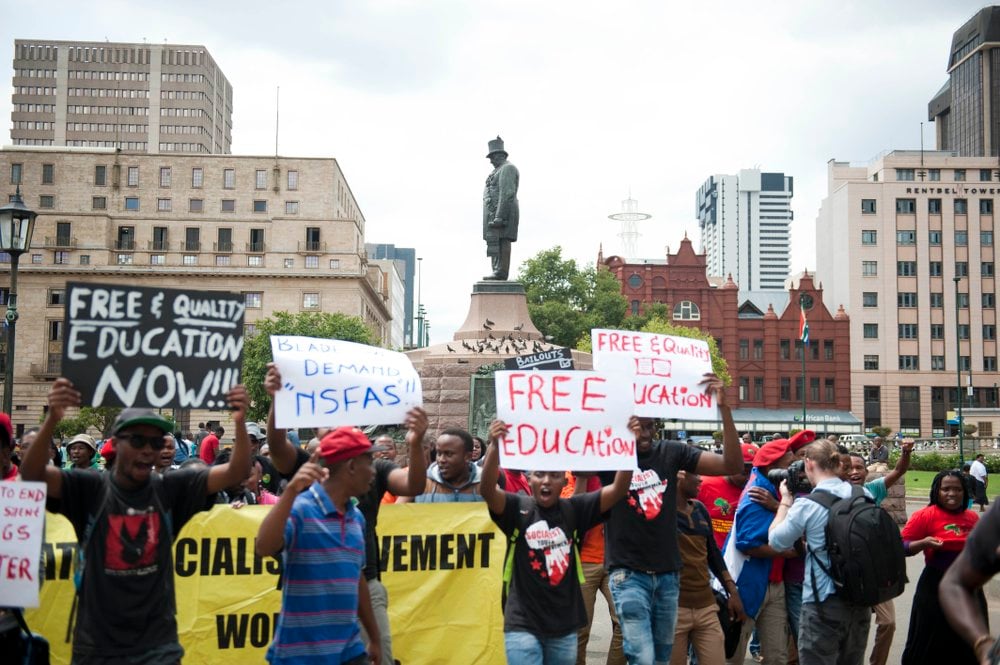The parliamentary portfolio committee on higher education believes new leaders at the National Student Financial Aid Scheme (Nsfas) will bring stability after the “worst” two years the scheme has seen while under administration.
The government’s struggling National Student Financial Aid Scheme (NSFAS) has “reached its sell by date”, and the only solution for poor students was a cost-free university education.
This is the message a group of students who marched on Blade Nzimande’s higher education and training department offices in Pretoria wanted to deliver to him.
But Nzimande was nowhere to be found. In fact, the department’s entrance was locked. Word must have got to the department that the students were intending to “occupy” the building.
Mostly active members of student organisations, they marched under the banner of the new Occupy Movement. The march drew about 100 students, with its leaders promising to mobilise more numbers if Nzimande did not address their demands.
NSFAS ‘failing students’
Jonas Magedi of the Socialist Youth Movement (SYM), a student organisation aligned to the Workers and Socialist Party (Wasp), led the marching group. “NSFAS has proven to be failing students,” he told journalists.
“We’re saying no black student should be turned away from university due to lack of funding while our ministers are becoming fat cats.”

The higher education and training department has repeatedly admitted NSFAS is unable to fund all students who qualify for it. The scheme funded only half the number of students who needed it last year, and again this year it’s left out thousands.
The shortage of funds is what has triggered the march. Institutions including the Tshwane University of Technology (TUT), Vaal University of Technology, University of KwaZulu-Natal and Cape Peninsula University of Technology saw a wave of protests last month due to the NSFAS debacle.
Sell-by date
Addressing students just before the march proceeded, student leader Sithembiso Ndlovu called on the government to implement free tertiary education. “NSFAS has reached its sell-by date. The only solution now is free education.”
The country’s middle-class was clearly not earning enough to afford university education, said the Ndlovu. He said the government should “tax the rich and fund free university education”.
Ndlovu urged Nzimande to “sell the R1-million” Mercedes Benz he bought for official duty when he was appointed minister in 2009, “and buy a Corolla. “We’re tired of rhetoric.”
Their campaign for free university would roll until the government heeded it, he vowed. “We’re not to going to retreat or surrender. We’re a generation of free education fighters.”
Strenuous
Thato Molopo, member of the Socialist Youth Movement, told the crowd it was becoming strenuous to protest over NSFAS each year. “We’re tired as students of fighting annually for an issue that can be addressed in a single motion. We demand free quality education. We want [Nzimande] to abolish students’ debts.”
Student Njabulo Kubheka, who hails from Newcastle in KwaZulu-Natal, told the Mail & Guardian that the march was much more personal to him. This is because he now has to discontinue his studies tourism management course at TUT.
“I owe the institution R22 000 for last year, and so they’ve said in order to register I must pay R3 000 upfront (R1 500 for tuition and R1 500 for residence). But I don’t have that money.
“It means I’m no longer a student because registration is closing tomorrow. I’ll have to go back home, whilst also still owing the university.”
‘Abolish debt’
The ANC Youth League also had representation at the march. Said Dimpho Xaba, its member in Pretoria: “We support this genuine call for free education. As the ANCYL we’re not going to isolate ourselves from [students’ struggles].”
A member of SRC at TUT last year, Xaba said he was aware 2 000 students at the institution have been blocked from graduating due to debt. And so, he called on Nzimande to “abolish previous debt of education”.
Khaye Nkwanyana, spokesperson to Nzimande, told journalists the government does aspire to make university education free, but it was currently unaffordable.
“There’s a commitment to gradually move towards that stage. That’s why making intervention through NSFAS. This year we have allocated over R9-billion to more than 405 000 students both in colleges and universities. So, government is not necessarily opposed to free education. But the issue is about the money available in fiscus.”
Nkwanyana said Nzimande had prior commitments in Cape Town, and that’s why he wasn’t available to receive students’ memorandum of demands.